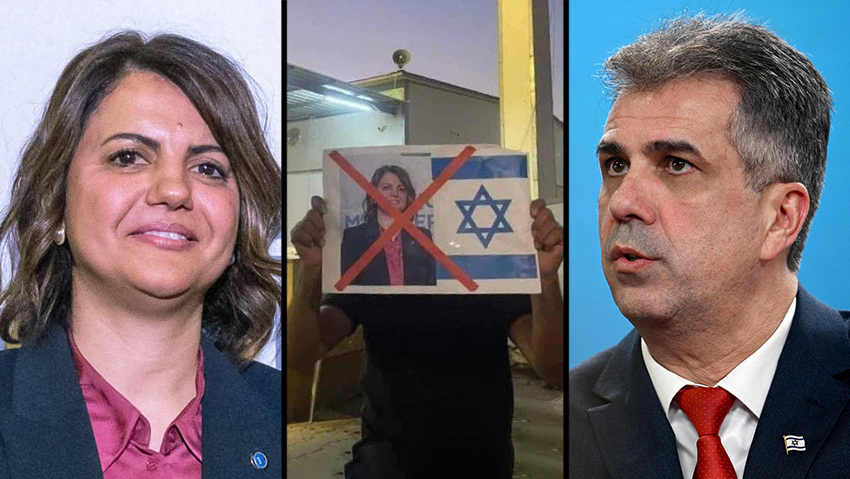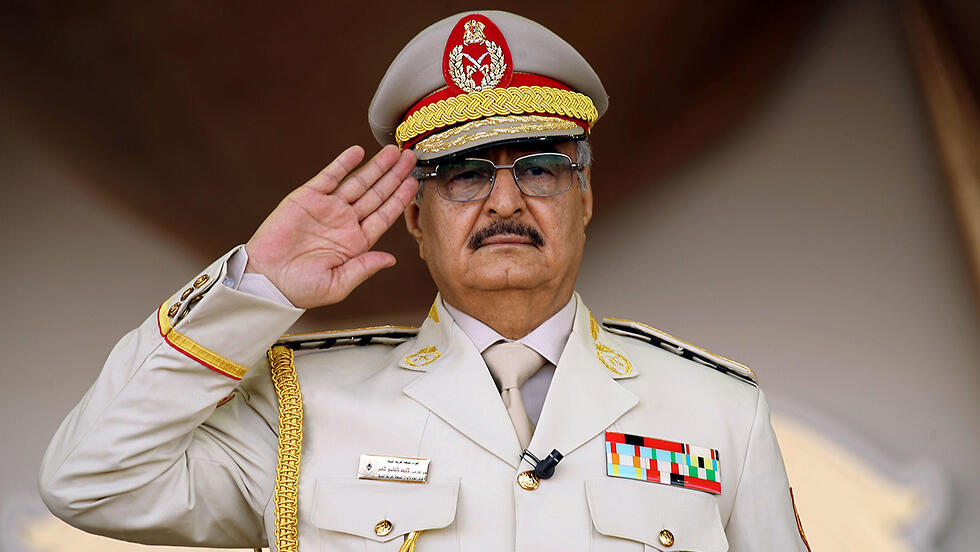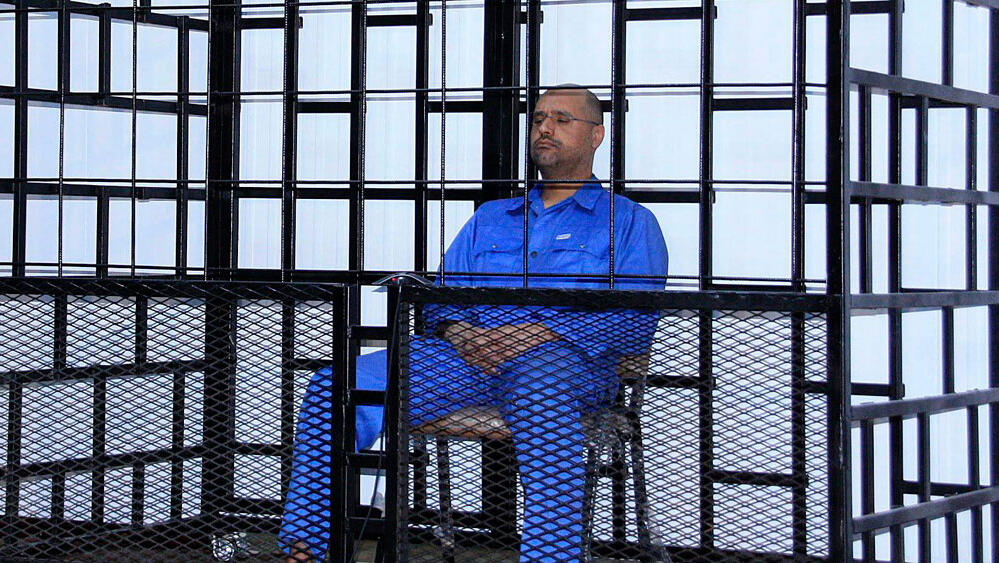Getting your Trinity Audio player ready...
Protests against Israeli-Libyan foreign ministers' meeting
The meeting in Rome between Foreign Minister Eli Cohen and his Libyan counterpart Najla Mangoush was not the first to take place between officials from the two countries. Israel and Libya have had discreet contacts over the past decades, some facilitated through Mossad and others through foreign governments or other intelligence bodies.
Read more:
Director-General of the Foreign Ministry, Ronen Levy previously served as the head of the Israel-Libya desk in the National Security Council. He also participated in the meeting between Cohen and Mangoush. One of the early diplomats who opened the door to Libya for Israel was Ron Prosor, Israel's Ambassador to Germany and former Director-General of the Foreign Ministry.
Libya had been entangled in political turmoil since 2011 when the 42-year rule of Muammar Gaddafi was toppled and ultimately murdered during an uprising. The country has been divided, with different power centers vying for control. In the western region, there is the Government of National Accord (GNA) led by Abdul Hamid al-Dabaiba, while in the east, General Khalifa Haftar established his power base.
Libya is currently maintaining a fragile ceasefire agreement reached at the end of 2020 between the Western government in Tripoli and the Eastern government in Benghazi
Israel has conducted discreet negotiations with both sides in Libya. General Haftar even said in 2021 that if he were to win the presidential elections (which ultimately did not take place), he would be interested in normalizing relations with Israel. In the same year, Ha'aretz reported that Haftar's son had secretly landed at Ben Gurion Airport on a private plane.
Libya after Gaddafi
(Powered by AI)
In 2017, Raphael Luzon, a Jewish native of Libya who has ties to the Libyan leadership, initiated a discreet meeting in Rhodes, Greece. This meeting brought together Libyan ministers of communication and education with a delegation from Israel, which included then-Minister for Social Equality Gila Gamliel, who was also born in Libya, among others.
During the meeting, one of the Libyan ministers spoke about the rights of Libyan Jews to return and receive compensation for the losses they incurred, when they left Libya. Raphael Luzon, the chairman of the Association of Libyan Jews, facilitated further meetings between Israeli officials and Libyan counterparts in Rome, Tunisia, and Greece.
In 2004, during the Second Intifada, a backchannel for dialogue was revealed that had the potential to lead to a peace agreement. These discussions were facilitated with the involvement of the United States, Britain, and Qatar, and took place in Vienna. The Kuwaiti newspaper, "Al-Siyassa," reported at the time that representatives from both countries met and agreed to the possibility of an Israeli delegation visiting Tripoli.
However, following the report, Libya sent a strongly worded letter to Israel, informing of the suspension of contacts due to the leak, which was attributed, to the office of then-Prime Minister Ariel Sharon. Reports from that time suggested that Libya accused Israel of not upholding the minimum standards of political ethics in international relations.
The head of Prime Minister Sharon's office at the time, Dov Weisglass denied the allegations. "It might have been conducted at the level of a different government agency or the Foreign Ministry. But even if it discussions did take place, we didn't rush to tell everyone."
In the following years, high-ranking Libyan officials openly suggested that relations with Israel could be a possibility in the future. In 2005, Saif al-Islam Gaddafi, the son of the Libyan leader, Muammar Gaddafi, said his country had no hostility towards Israel. He emphasized that Libya was more of an African nation than an Arab one and said that if the Palestinians engaged in discussions with Israel, Libya would not oppose having any form of diplomatic relations with Jerusalem.
In 2010, Raphael Hadad, an Israeli-Tunisian artist and photographer, was arrested in Libya while documenting Jewish cemeteries and synagogues. He was detained on suspicion of being an agent of Mossad or involved in arms trafficking. During his imprisonment, which lasted for several weeks, Hadad endured interrogations. When news of his arrest reached Israel, the incident was subjected to a media blackout until his release.
During this period, Israel's Foreign Minister, Avigdor Lieberman, conducted covert communications through his close associates, including the Jewish-Austrian businessman Martin Schlaff and Walter Arbib, a Canadian Jewish businessman. Schlaff and Arbib established connections with Saif al-Islam Gaddafi.
Initially, Libya had demanded that the "Kadafi Foundation" be allowed to send aid to the Gaza Strip, but this proposal was met with an Israeli refusal. After another month, an agreement for Hadad's release was reached, which was presented in Libya as a gesture of goodwill toward Tunisia, just ahead of Ramadan. In return, a shipment of goods to Gaza would dock in El-Arish, Egypt, and its contents would be transferred to the Strip through the Rafah Crossing. Libya was also permitted to construct around 20 temporary structures in Gaza, and Israel released several Palestinian prisoners.
Hadad was flown to Vienna in Schlaff's private jet and returned to Israel the following day with Lieberman. Altogether, he spent 170 days in Libyan custody. This matter, within Lieberman's circle, was cited as an example of how effective diplomatic dealings can be conducted, especially when done discreetly.
In the years 2020-2021, the Libyans requested Prime Minister Benjamin Netanyahu to mediate between them and Russian President Vladimir Putin in order to secure the release of Russian prisoners, including members of the Wagner Group, who had operated in Libya. These negotiations involved the Israeli Intelligence Ministry and the Mossad. It's possible that the Libyans believed that the path to the Kremlin went through Netanyahu. However, these contacts did not lead to a deal.
Retired Lieutenant Colonel Eran Lerman, currently the Vice President of the Jerusalem Institute for Strategy and Security, penned a paper a year and a half ago on Israel's stance and the struggle for Libya's future. He argued that Israel has an interest in preventing Iran from gaining control of strategic assets in the region. According to his analysis, there appears to be active interest from several powerful figures in Libya in engaging with Israel and securing diplomatic (primarily with Washington, first and foremost), intelligence, and military support. These efforts encompass discussions both within and around the Haftar sphere of influence and at the highest levels of the Dbeibah government.








